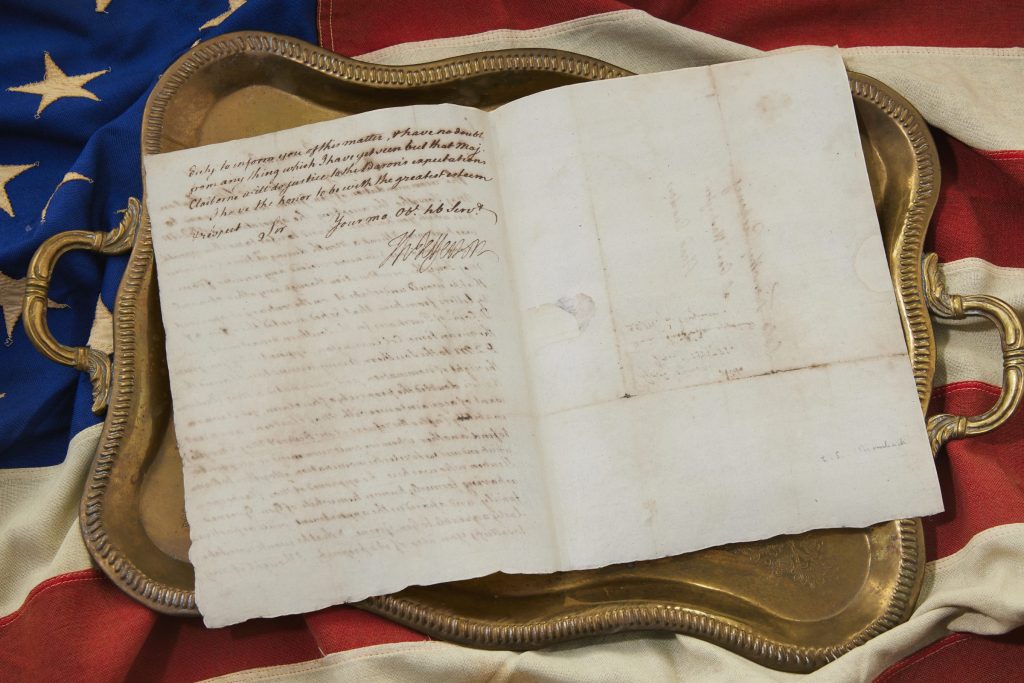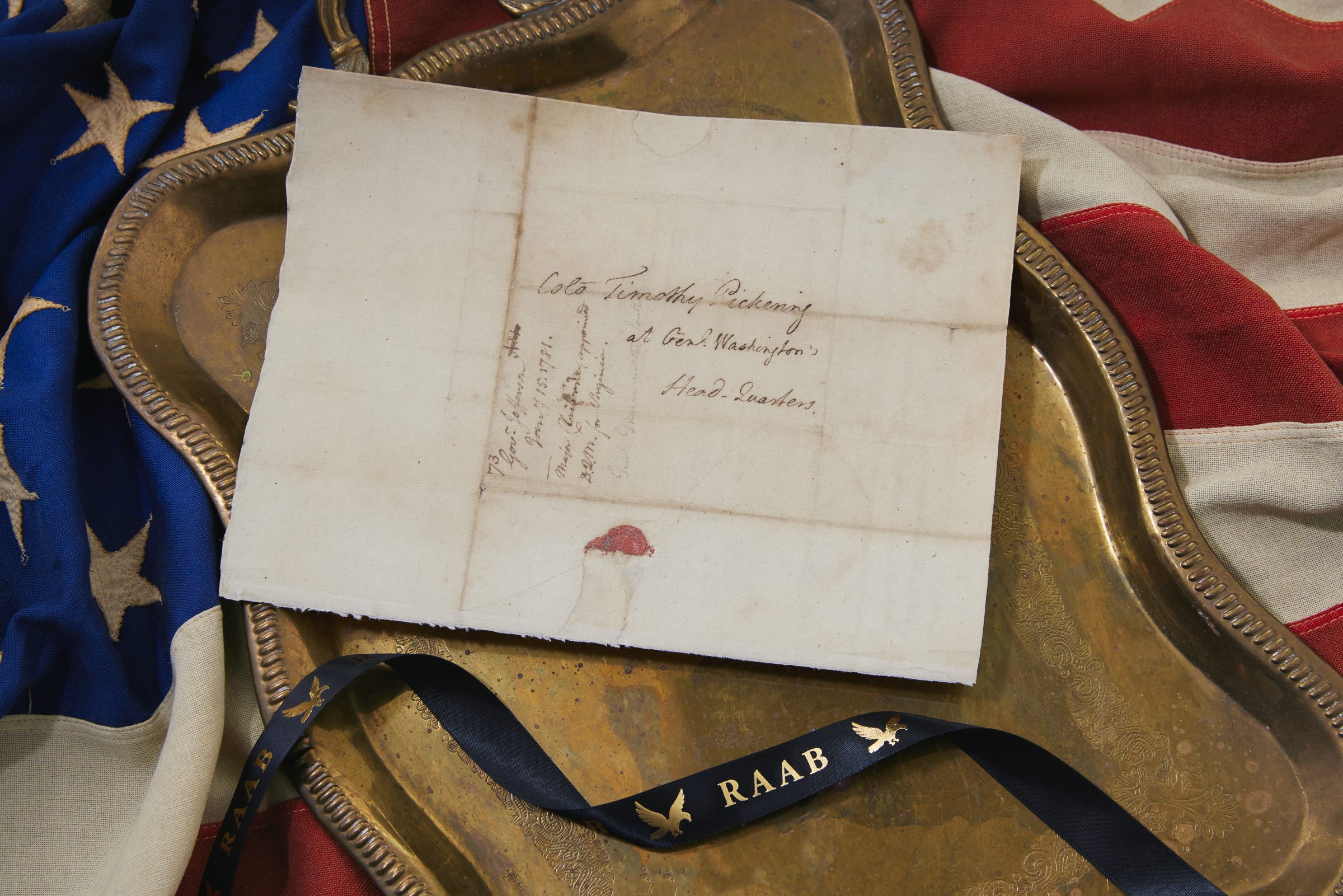As Benedict Arnold Raided Richmond, in a Letter to “Genl. Washington’s Head-Quarters”, Governor Thomas Jefferson Rushes to Supply the Continental Army in His State in the Face of the Invasion







In doing so he relies on the experienced Baron von Steuben to aid him in a key appointment
- Currency:
- USD
- GBP
- JPY
- EUR
- CNY
In a long letter mentioning Nathanael Greene, he justifies his decision to hurry the appointment of the Deputy Quartermaster of Southern Virginia, saying “Maj. Claiborne will do justice to the Baron’s expectations.”
This letter has been in the same private collection for generations
Following Horatio Gates’s defeat at Camden, South Carolina,...
In a long letter mentioning Nathanael Greene, he justifies his decision to hurry the appointment of the Deputy Quartermaster of Southern Virginia, saying
“Maj. Claiborne will do justice to the Baron’s expectations.”
This letter has been in the same private collection for generations
Following Horatio Gates’s defeat at Camden, South Carolina, Washington’s supporters in the Continental Congress allowed the commander in chief to select a new commanding general for the Southern Department, a break from its earlier insistence on reserving the choice of such important positions to civilian authority. Washington did not hesitate in picking Nathanael Greene, knowing that his experiences as both a combat commander and the quartermaster general made Greene the best choice to rebuild a shattered department. But he also ordered Inspector General Friedrich von Steuben to proceed south as well, informing him that he was to take over the department’s base area in Virginia and begin passing supplies and reinforcements on to Greene. Greene moved rapidly southward, meeting with civilian leaders along the way, and reached Charlotte, North Carolina, on December 2, 1780. He took command from Gates the next day.
Greene established a quartermaster general, Edward Carrington, and ordered him to reconnoiter routes back to Virginia. Greene understood that in the Deep South, where roads were few and far apart, the rivers played a critical role.
Greene himself headed farther South. He left Charlotte on December 20 and reached Cheraw on the 26th. His troops included 650 veteran Continentals plus almost as many Virginia and Maryland replacements, some of whom were also veterans who had reenlisted. They were soon reinforced by 400 more Virginia recruits under Colonel John Greene, the first of the detachments pushed forward by Steuben. Henry Lee’s Second Partisan Corps arrived on January 13 1781, and Nathanael Greene immediately sent it to support the famed Swamp Fox, Francis Marion (who raided Georgetown, South Carolina, on 24 January).
In the meantime, on the evening of January 1, 1781, Lord Cornwallis got unnerving reports from two different sources that American commander Daniel Morgan, detached from Greene’s main force, was approaching with three thousand men. Cornwallis ordered General Tarleton to protect this strategically important place and to find Morgan.
At the same time, Benedict Arnold, now in the service of the British, continued his movements into Virginia, reaching Richmond. Arnold wrote a letter to Jefferson, saying that if he could move the city’s tobacco stores and military arms to his ships, he would leave Richmond unharmed. Jefferson’s response was livid, refusing that a turncoat do anything to Richmond’s supplies. Upon receiving the letter the next day on January 6, Arnold was enraged, and ordered Richmond to be set to the torch. British troops then started a rampage across the city, burning government buildings as well as private homes, ransacking the city of its valuables and supplies. On January 19, the Richmond Campaign ended when Benedict Arnold’s weary troops reached Portsmouth.
It was in this environment that Greene and General Washington sought to bolster their system of supplies distribution in the south. This involved the appointment of Carrington and also a new Deputy Quartermaster. The latter position was a source of some bother for Jefferson. Greene had recommended Major Forsyth for the position around the same time he had appointed Carrington. Jefferson’s letter to Forsyth offering him the position had gone unresponded to for a month, during which time the “Business of transportation suffered greatly for want of a head to the several Deputies and much distressed the Southern Army.” So at Von Steuben’s and Carrington’s insistence, Jefferson offered the position to Major Claiborne, who would in fact serve in that position and set about organizing Virginia’s response to the British invasion.
Letter signed, Richmond, January 15. 1781, to “Colo Timothy Pickering at Genl. Washington’s Head-Quarters”, the address written in Jefferson’s hand. “I wrote you in a former letter that on the recommendation of Gen. Greene we had proposed to Maj. Forsythe the accepting the appointment of Deputy Quartermaster here which you had been pleased to refer to us. This appointment was kept open I think a Month, during which time (and indeed at any time since) we never received any answer from Maj. Forsythe, or intimation through any other channel that he would undertake it. On the contrary it appeared by letters from him that he had accepted the office of Deputy Commissary of Purchases for the Southern department. In the mean time Col. Carrington, appointed by Gen. Greene Deputy Quartermaster to the Southern Army, arrived here, claimed the right of nomination, and nominated a Maj. Claiborne. Tho’ we doubted the propriety of his claim, yet it was a want of acquaintance with Maj. Claiborne, and a real inability (after the refusal of Mr. Divers and Major Forsythe) to find another whom we could recommend in all points, which induced us to refer the nomination altogether to Baron Steuben who was here. He approved of Maj. Claiborne as having formerly known him while of Gen. Green’s family and assured us the appointment would be particularly agreeable to Gen. Greene, and that he would undertake to satisfy you also of it’s propriety. I thought it my duty to inform you of this matter, and have no doubt from any thing which I have yet seen but that Maj. Claiborne will do justice to the Baron’s expectations.”
It is addressed to “Colo Timothy Pickering at Genl. Washington’s Head-Quarters”; docketed: “Govr. Jefferson Jany. 15, 1781. Major Claiborne appointed D. Q. M. for Virginia.” Lightly silked.
This letter has been in the same private collection for generations.

Frame, Display, Preserve
Each frame is custom constructed, using only proper museum archival materials. This includes:The finest frames, tailored to match the document you have chosen. These can period style, antiqued, gilded, wood, etc. Fabric mats, including silk and satin, as well as museum mat board with hand painted bevels. Attachment of the document to the matting to ensure its protection. This "hinging" is done according to archival standards. Protective "glass," or Tru Vue Optium Acrylic glazing, which is shatter resistant, 99% UV protective, and anti-reflective. You benefit from our decades of experience in designing and creating beautiful, compelling, and protective framed historical documents.
Learn more about our Framing Services

















































































































